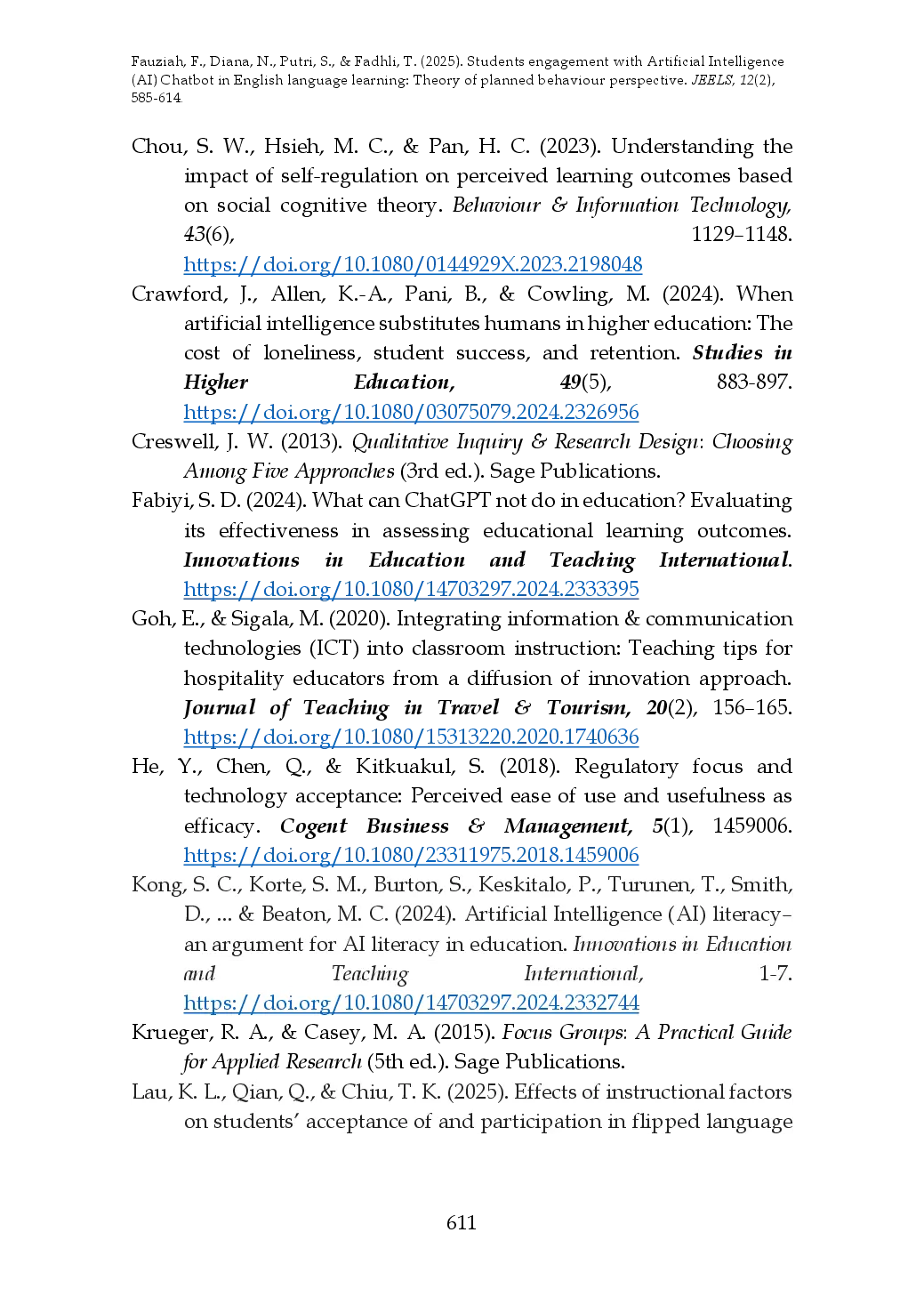IAIN KEDIRIIAIN KEDIRI
JEELS (Journal of English Education and Linguistics Studies)JEELS (Journal of English Education and Linguistics Studies)Engagement plays a critical role in enhancing English as a Foreign Language (EFL) learning. Therefore, investigating the factors that influence engagement is essential. This study explores the mechanisms through which engagement is shaped by key factors among EFL learners, within the framework of Self-Determination Theory (SDT). Specifically, the focus is on autonomy support, enjoyment, and ideal L2 self. A total of 413 EFL learners from diverse colleges participated in an online survey, where these constructs were measured using four validated scales. Structural Equation Modeling (SEM) via AMOS 24 was employed for data analysis. The results indicated that autonomy support, enjoyment, and ideal L2 self directly and positively predicted learner engagement. Furthermore, autonomy support indirectly influenced engagement through enjoyment, ideal L2 self, or both. These findings highlight the significance of these factors in fostering EFL learner engagement and offer valuable insights for enhancing EFL education and guiding future research on engagement dynamics.
This study confirms the positive influence of autonomy support on EFL learners engagement, both directly and indirectly through enjoyment and ideal L2 self.The findings underscore the importance of fostering a learning environment that supports learner autonomy and cultivates positive emotional experiences.Specifically, enjoyment appears to be a stronger mediator than ideal L2 self in the relationship between autonomy support and engagement, suggesting that prioritizing enjoyable learning experiences is crucial.These results contribute to a deeper understanding of the motivational factors driving EFL learning and provide valuable insights for educators and researchers.
Future research should explore the dynamic interplay between autonomy support, enjoyment, and ideal L2 self over time using longitudinal designs to establish causal relationships. Investigating the role of teacher characteristics and behaviors, such as teacher training in autonomy-supportive practices, could provide insights into how to effectively implement these principles in EFL classrooms. Furthermore, exploring the influence of contextual factors, such as classroom size and cultural norms, on the relationship between these variables is warranted. Finally, studies could examine the effectiveness of interventions designed to enhance autonomy support, enjoyment, and ideal L2 self in EFL learning contexts, potentially utilizing mixed-methods approaches to capture both quantitative and qualitative data, and ultimately contributing to more effective pedagogical strategies for fostering student engagement and success in EFL education.
- 0. loading doi.org/10.1111/j.1460-2466.2011.01593.x0 loading doi 10 1111 j 1460 2466 2011 01593 x
- Positive emotions and intrinsic motivation: A self-determination theory perspective on using co-created... doi.org/10.1177/13621688231204443Positive emotions and intrinsic motivation A self determination theory perspective on using co created doi 10 1177 13621688231204443
- Frontiers | Researching and Practicing Positive Psychology in Second/Foreign Language Learning and Teaching:... doi.org/10.3389/fpsyg.2021.731721Frontiers Researching and Practicing Positive Psychology in Second Foreign Language Learning and Teaching doi 10 3389 fpsyg 2021 731721
- What do we know about L2 teachers' emotion regulation? A bibliometric analysis of the pertinent... journals.bilpubgroup.com/index.php/fls/article/view/6471What do we know about L2 teachers emotion regulation A bibliometric analysis of the pertinent journals bilpubgroup index php fls article view 6471
| File size | 676.8 KB |
| Pages | 26 |
| DMCA | ReportReport |
Related /
IAIN KEDIRIIAIN KEDIRI Metode campuran data dikumpulkan dari 178 responden (100 siswa, 60 guru, 18 administrator) melalui kuesioner terstruktur dan wawancara semi‑struktur.Metode campuran data dikumpulkan dari 178 responden (100 siswa, 60 guru, 18 administrator) melalui kuesioner terstruktur dan wawancara semi‑struktur.
IAIN KEDIRIIAIN KEDIRI Hasil menunjukkan bahwa YouTube memfasilitasi penjelasan multimodal dan sintesis konten melalui video yang dibuat mahasiswa, sedangkan WhatsApp memungkinkanHasil menunjukkan bahwa YouTube memfasilitasi penjelasan multimodal dan sintesis konten melalui video yang dibuat mahasiswa, sedangkan WhatsApp memungkinkan
IAIN KEDIRIIAIN KEDIRI Studi ini menggunakan pendekatan kasus nexus, dengan lima peserta yang dipilih secara purposif dari 38 siswa yang mengambil program ekonomi di sebuah institusiStudi ini menggunakan pendekatan kasus nexus, dengan lima peserta yang dipilih secara purposif dari 38 siswa yang mengambil program ekonomi di sebuah institusi
IAIN KEDIRIIAIN KEDIRI Temuan menunjukkan bahwa sikap positif terhadap chatbot AI, seperti kemampuannya memberikan umpan balik segera dan pengalaman belajar yang disesuaikan,Temuan menunjukkan bahwa sikap positif terhadap chatbot AI, seperti kemampuannya memberikan umpan balik segera dan pengalaman belajar yang disesuaikan,
Useful /
IAIN KEDIRIIAIN KEDIRI Strategi coping yang paling umum digunakan adalah strategi sosial-afektif dan fluency-oriented. Hasil analisis menunjukkan perbedaan signifikan dalam penggunaanStrategi coping yang paling umum digunakan adalah strategi sosial-afektif dan fluency-oriented. Hasil analisis menunjukkan perbedaan signifikan dalam penggunaan
IAIN KEDIRIIAIN KEDIRI Students with low anxiety generally have more active exposure to and use of English and better self-management strategies. The solutions that studentsStudents with low anxiety generally have more active exposure to and use of English and better self-management strategies. The solutions that students
IAIN KEDIRIIAIN KEDIRI Penelitian ini menyarankan guru bahasa Inggris sekolah menengah kejuruan menggunakan PjBL untuk siswa dengan kemampuan intrapersonal yang kuat dan DL untukPenelitian ini menyarankan guru bahasa Inggris sekolah menengah kejuruan menggunakan PjBL untuk siswa dengan kemampuan intrapersonal yang kuat dan DL untuk
IAIN KEDIRIIAIN KEDIRI Guru biasanya memberikan Umpan Balik Korektif Oral (OCF) kepada siswa selama pembelajaran di kelas, terutama ketika belajar bahasa Inggris yang mencakupGuru biasanya memberikan Umpan Balik Korektif Oral (OCF) kepada siswa selama pembelajaran di kelas, terutama ketika belajar bahasa Inggris yang mencakup







